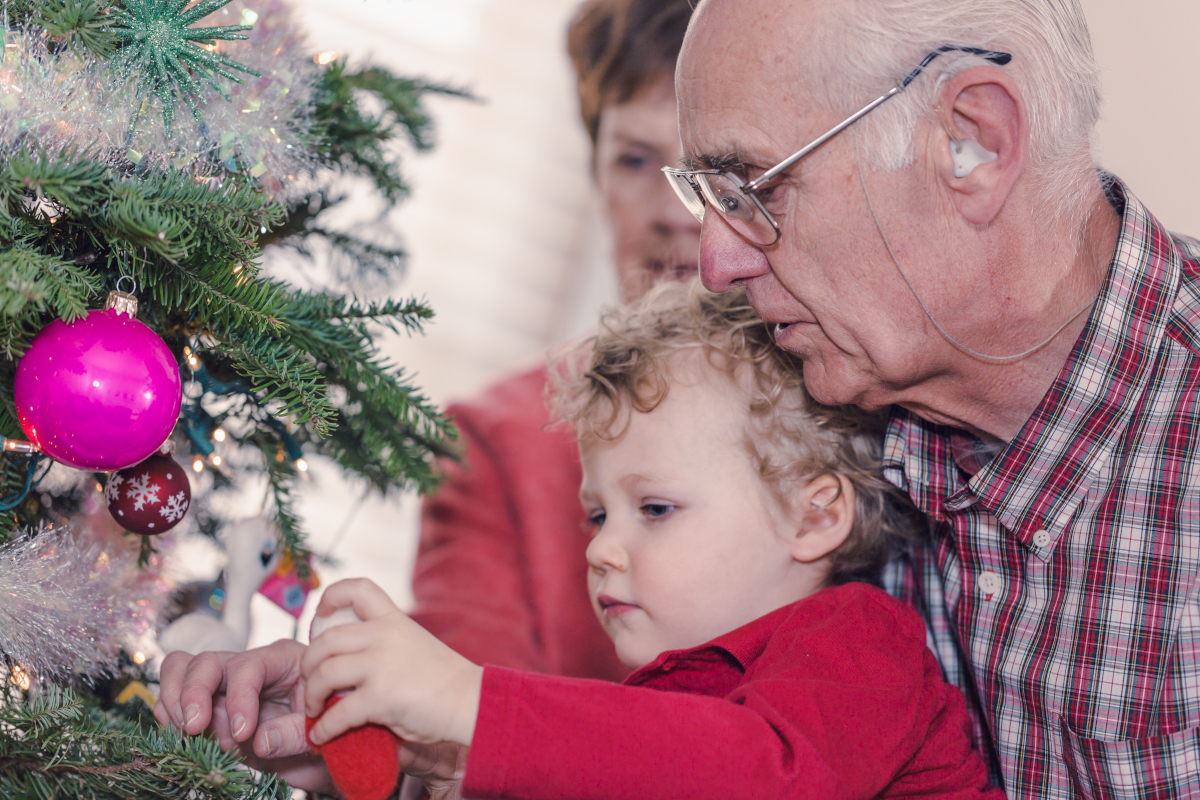The holiday season is an important time for many people. We begin forming traditions and setting expectations at a young age. For many families, this is a time to come together and celebrate. There are holiday dinners, gift exchanges, and lots of other activities. It can be a wonderful time.
This isn’t always the case for everyone. Some people have negative associations with the holidays. This can stem from bad experiences or loss. Senior citizens in particular face hardships during the holidays.
“Statistics show that two million of the 34 million Americans age 65 and older suffer from some form of depression,” says family clinical care coordinator Mike Homan with Behavioral Health Services at OSF HealthCare Saint Anthony’s Health Center.
“Notably, only 3% receive treatment. It is important to remember that depression is a medical illness that can be treated with medication and/or psychotherapy and that the prognosis of older individuals is excellent when they seek treatment for this disorder.”
Unfortunately, many people do not seek treatment. Some may not realize that they are dealing with depression during the holidays.
The older we get, the more people we will lose. Some seniors may have outlived all their siblings and may have few younger family members to turn to for support. Others may have also lost many friends along the way.
Living situation and medical conditions can make it difficult to socialize and meet new people. Some seniors cannot go out on their own due to mobility limitations. This can lead to isolation which increases the risk of depression.
The holidays can be a painful reminder of the people who are gone and places that may not exist anymore. For some seniors, it’s especially difficult seeing others with their loved ones. It’s a reminder of the passage of time and those who remain in our memories.
Older adults around the world also struggled after the COVID-19 outbreak. Many elderly parents had to adapt to post-pandemic life, which caused lingering stress and mental health concerns.
How to Recognize Senior Depression
Friends, family, and seniors should all know how to recognize the signs of depression. Some people may not realize that they are dealing with a treatable condition. Others may be afraid to ask for help or may not know where to turn to for support.
Common signs of depression include:
- Poor personal hygiene
- Avoiding social interactions
- Persistent feeling of sadness or anxiety
- Feeling empty, hopeless, helpless, or guilty
- Loss of interest in enjoyable activities
- Excessive sleeping
- Decreased energy
- Insomnia
- Self-harm
What Can You Do to Help a Loved One with Depression?
One of the most important things a person with depression can do is seek medical treatment. If your loved one is showing the symptoms of depression, you should talk to them about getting help. What else can alleviate depression in seniors?
- Engage with Others
Isolation will feed depression. Counter this by engaging with others. It’s not easy, because you or your loved one will feel inclined to avoid social contact. Fight against it by spending time with others. Go to community events and schedule outings. A visit with friends or family for an afternoon can make a difference.
Studies have found that an active social life has a positive impact on emotional, mental, and physical health.
- Stay Physically Active
Exercise is great for seniors. Doing low-impact, senior-friendly workouts will help you stay fit and free of pain. It also builds self-esteem, which is great for a person’s mental health.
Physical activity releases endorphins, which are brain chemicals that make us feel good. It also helps break the cycle of negative thoughts that cause anxiety and depression.
- Find a Sense of Purpose
Many people experience depression because they have lost their sense of purpose. Seniors who are older may not be able to do what they use to do. They no longer go to work or care for children or a spouse. They may begin to feel useless, which can lead to an unhealthy mental state.
Seniors should find a sense of purpose. They can still contribute something to the world. It can be volunteering at a charity, joining a club, or being there for someone else.
- Treat Sleep Problems
Sleep problems can wreak havoc on a person’s emotional and mental health. Addressing these issues will help seniors gain control over their wellness.
If you struggle to maintain a healthy sleep schedule, seek medical advice. Your doctor can advise you on lifestyle changes or medications that might help. Having a bedtime ritual is a good way to start. Set aside time to wind down with calming activities like reading or meditating before going to bed.
- Give Seniors a Responsibility
Having a responsibility can make seniors feel needed. It gives them a sense of purpose and a reason to get out of bed each day.
What responsibility will work best will depend on their ability and mobility. Those who are capable could benefit from a pet. A plant is a good alternative for people with medical conditions, limitations, or who cannot have pets in their homes.
- Express Love
Expressing love can help a senior with depression. It may not fix the problem, but it will let them know that they are needed and wanted. This can give them a sense of purpose, especially for the recently widowed.
Expressions of love can be given in different ways. Hugs and words work well. Tell them what they mean to you and that having them in your life is important to you. You should also make time to be there to listen to them.
Love can help someone you care about find the strength to get up in the morning while they fight depression.
What Should You Do If You Are a Senior with Depression?
If you are a senior and you think you have depression, you should take steps to get the support you need. Understand that feeling this way is not a normal part of aging. Life doesn’t have to feel negative. Everyone deserves to enjoy their golden years, including you.
First, you should talk to someone you trust about how you are feeling. They need to know so that they can provide support.
You should also schedule a consultation with a doctor. If you aren’t sure where to begin, start with your general practitioner. Tell them what’s going on and ask for a recommendation to a mental health professional.
You can also take these steps to improve your lifestyle to reduce the effects of depression:
- Stay physically active and maintain a healthy body weight
- Push yourself to go out, be around others, and meet new people
- Plan to get enough sleep each night and avoid excessive sleeping
- Avoid consumption of alcohol and do not use substances to cope
- Live in the present and avoid focusing too much on the future
- Try meditation and other mindfulness practices
Senior living can help the elderly avoid isolation and depression. Now is a good time to find out what services are included if you move into an assisted living community. These facilities bring seniors together, so you are close to a group of peers to make friends and socialize. A community also provides all the necessities and additional services in one place.
Older adults feel less anxious when they have everything they need with a support network built in.
Casas Senior Assisted Living offers a residential environment with caring staff and comfortable accommodations. Visit our website to learn more about how we help seniors stay physically and mentally healthy.

